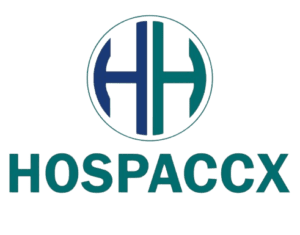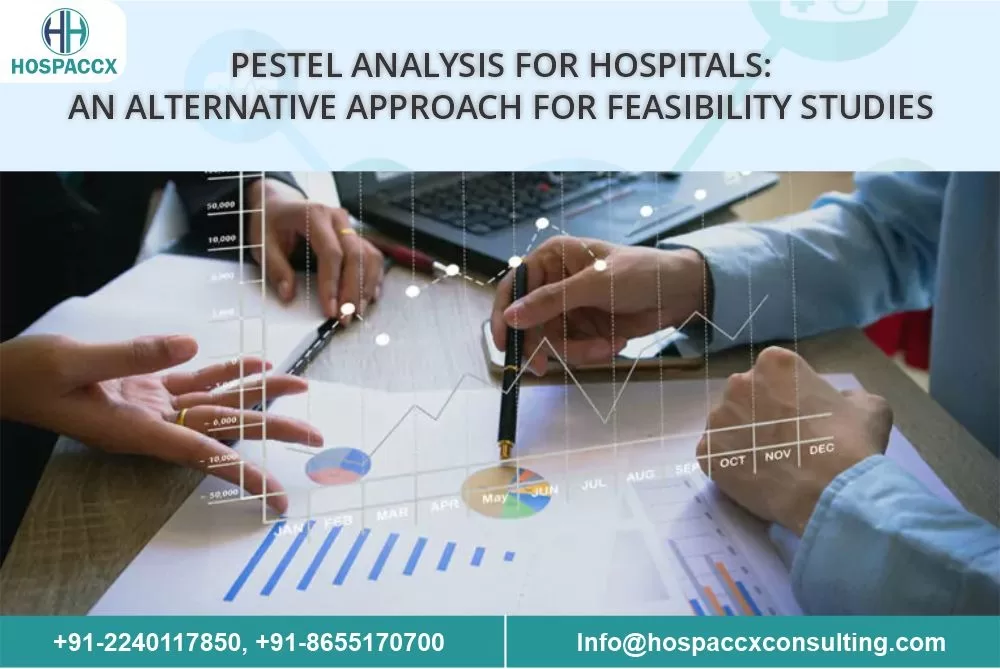By Hospaccx Healthcare Business Consulting
Hospitals operate within a complex and dynamic environment influenced by multiple external factors. A PESTEL analysis is a robust framework used during a hospital feasibility study to understand these external influences. This alternative approach reimagines the PESTEL analysis by focusing on its integration into hospital feasibility and strategic decision-making, emphasizing real-world applications.
- Political Factors
Hospitals are highly regulated entities, making political factors a critical consideration.
- Healthcare Infrastructure Policies: Government policies that encourage hospital investments, such as public-private partnerships (PPPs).
- Global Health Regulations: International standards impacting medical practices (e.g., WHO guidelines).
- Local Government Stability: Political stability ensures predictable support and regulations.
- Subsidies and Incentives: Programs supporting rural healthcare infrastructure or specific specialties like cardiology or oncology.
Feasibility Focus: Examine government support for healthcare investments and regulatory stability in the target region.
- Economic Factors
The economic environment determines the financial feasibility of hospitals.
- Healthcare Spending Trends: Analyze per capita healthcare expenditure to gauge affordability.
- Hospital Revenue Models: Fee-for-service, insurance-based payments, or government funding models.
- Regional Wealth Disparity: Identifying underserved but economically viable markets.
- Cost of Capital: Interest rates for funding hospital infrastructure projects.
Feasibility Focus: Develop financial projections considering the region’s economic health and funding options.
- Social Factors
Social factors directly influence patient behavior and demand for healthcare services.
- Disease Patterns: Regional prevalence of chronic diseases like diabetes or heart conditions.
- Population Growth: Growing populations in urban centers demand robust healthcare systems.
- Cultural Sensitivities: Tailoring services to cultural or religious practices (e.g., gender-specific care).
- Health Literacy: Communities with higher health awareness often demand advanced healthcare services.
Feasibility Focus: Assess social trends to align service offerings with community needs and preferences.
- Technological Factors
Technology is a significant driver of hospital efficiency and patient satisfaction.
- Hospital Management Systems: EMR adoption and smart hospital technologies.
- AI and Robotics: Advanced diagnostic and surgical tools enhancing precision and efficiency.
- Telemedicine Platforms: Expansion of healthcare access to remote areas.
- Medical Innovations: Cutting-edge treatments attracting patients seeking advanced care.
Feasibility Focus: Determine the cost-benefit ratio of adopting new technologies based on patient demographics and hospital size.
- Environmental Factors
Sustainability and environmental regulations are critical to modern hospital planning.
- Green Building Initiatives: LEED-certified hospital designs for energy efficiency.
- Waste Management: Proper disposal of biomedical waste to meet environmental standards.
- Climate Impact: Hospitals in flood-prone or disaster-prone areas require additional safeguards.
- Sustainable Practices: Adoption of renewable energy and eco-friendly materials in hospital construction.
Feasibility Focus: Evaluate environmental risks and compliance costs when selecting a hospital location and design.
- Legal Factors
Legal compliance ensures smooth operations and minimizes risks for hospitals.
- Licensing and Approvals: Mandatory licenses for infrastructure and services.
- Patient Privacy Laws: Compliance with data protection regulations like HIPAA or GDPR.
- Employee Laws: Rights, working conditions, and insurance for medical and non-medical staff.
- Litigation Risk: Mitigation strategies against potential malpractice suits.
Feasibility Focus: Incorporate legal cost estimates and compliance timelines into project planning.
Integrating PESTEL into Feasibility Studies
By applying this tailored PESTEL analysis approach, hospitals can:
- Identify Key Influences: Understand how each external factor impacts the hospital’s viability.
- Develop Risk Mitigation Strategies: Proactively address potential challenges in regulatory, financial, or environmental areas.
- Align with Market Trends: Adapt services and infrastructure to meet changing demands and opportunities.
Hospaccx Expertise in PESTEL Analysis for Feasibility Studies
Hospaccx Healthcare Business Consulting integrates tools like PESTEL analysis to create customized hospital feasibility studies that go beyond traditional approaches. Our services ensure:
- Comprehensive assessment of external factors.
- Actionable insights for decision-making.
- Strategic recommendations aligned with local and global healthcare trends.
If you’re planning a hospital project and need an expert feasibility study, connect with us at info@hospaccxconsulting.com.
Transform your vision into reality with precision and insight.

